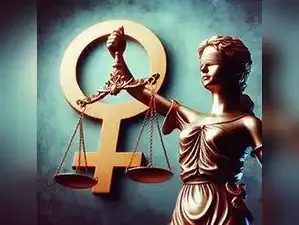We often witness flashes of patriarchy and misogyny, only to dismiss them as outliers, or view them as symptoms of a society in transition. But when those moments emanate from institutions, we seek remedy - such as the Supreme Court - then it becomes necessary to question them. On Tuesday, while hearing an alimony case, CJI B R Gavai expressed his incredulity that a 'well-educated' woman was demanding a divorce settlement from her husband. His outburst reflects a mindset that cannot fathom the possibility that a woman could have contributed to her husband's wealth and is, thus, a rightful claimant to a share upon the dissolution of their union.
This is not the first time that top court judges have made observations that reflect a skewed view. A few months ago, Justices B V Nagarathna and Satish Chandra Sharma granted interim bail to a 23-year-old man accused of rape. By their account, a 40-year-old woman 'is no baby', and her complaint - considered credible by the police - was deficient because 'a single hand can't clap'. Unfortunately, examples of such egregious gender insensitivity veering towards misogyny crop up far too often in the higher courts.
All stereotypes - more so those rooted in gender - hinder the transformative project of the Constitution. The Supreme Court is guardian of the Constitution, which recognises equality as a right. Not only does the apex court guard the integrity of the Constitution, it also provides a moral compass for society. In 2023, it recognised the need for gender sensitisation, producing a booklet for the legal community with the aim of 'actively challenging and dispelling harmful stereotypes on the basis of gender'. Perhaps it's time for judges to read this publication - so that the courts can live up to their promise.
This is not the first time that top court judges have made observations that reflect a skewed view. A few months ago, Justices B V Nagarathna and Satish Chandra Sharma granted interim bail to a 23-year-old man accused of rape. By their account, a 40-year-old woman 'is no baby', and her complaint - considered credible by the police - was deficient because 'a single hand can't clap'. Unfortunately, examples of such egregious gender insensitivity veering towards misogyny crop up far too often in the higher courts.
All stereotypes - more so those rooted in gender - hinder the transformative project of the Constitution. The Supreme Court is guardian of the Constitution, which recognises equality as a right. Not only does the apex court guard the integrity of the Constitution, it also provides a moral compass for society. In 2023, it recognised the need for gender sensitisation, producing a booklet for the legal community with the aim of 'actively challenging and dispelling harmful stereotypes on the basis of gender'. Perhaps it's time for judges to read this publication - so that the courts can live up to their promise.





